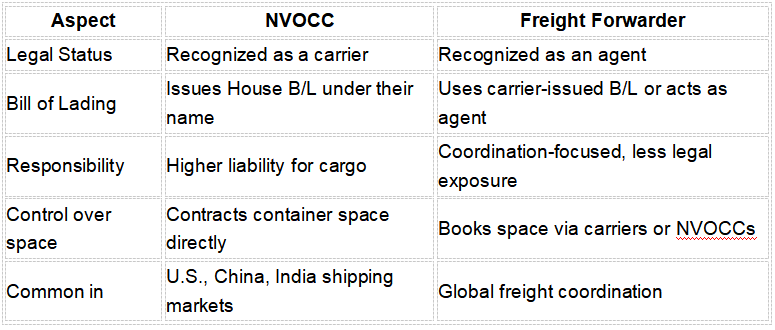Blog
![]() 18-Apr-2025
18-Apr-2025
If you're in the shipping or logistics industry — or even just dabbling in international trade — you’ve likely come across two commonly used terms: NVOCC and freight forwarder. At first glance, they seem interchangeable, especially since both help move goods across borders. But there are key distinctions between the two that can impact your supply chain efficiency, cost, and even legal liability.
Let’s break it down in plain terms.
What Is a Freight Forwarder?
A freight forwarder is a service provider that arranges international shipments for individuals or companies. They don’t typically own ships, planes, or trucks but coordinate with carriers to ensure that cargo moves from point A to point B.
Think of them as travel agents for your cargo — they handle bookings, documentation, customs clearance, insurance, and even warehousing if needed. Their strength lies in flexibility and broad networks.
What Is an NVOCC?
NVOCC stands for Non-Vessel Operating Common Carrier. Despite the name, an NVOCC is considered a carrier by law in many countries, especially under ocean shipping regulations.
Unlike freight forwarders, an NVOCC issues its own House Bill of Lading (HBL), assumes more legal responsibility, and often contracts directly with shipping lines for space. They may not own vessels, but they act like carriers in a commercial sense.
Key Differences Between NVOCC and Freight Forwarder

Why the Difference Matters to You
Choosing between an NVOCC and a freight forwarder isn’t just about terminology. It affects:
- Liability: Who’s legally responsible if something goes wrong?
- Pricing: NVOCCs may offer better rates due to volume contracts.
- Service depth: Freight forwarders can offer door-to-door, multi-modal services.
For large-volume shippers, working with an NVOCC might provide direct access to better container rates. For smaller shippers or complex routes, a freight forwarder’s flexibility can be a huge plus.
Final Thoughts
At the end of the day, both NVOCCs and freight forwarders play essential roles in global trade. Sometimes, one company can act as both, depending on the service they’re offering. The trick is to understand what you need — control, cost efficiency, flexibility — and pick the partner that aligns with your logistics goals.
So next time you’re sourcing a shipping partner, ask: Am I dealing with an NVOCC or a freight forwarder? And more importantly — which one suits my cargo best?
Related blogs
 108
108